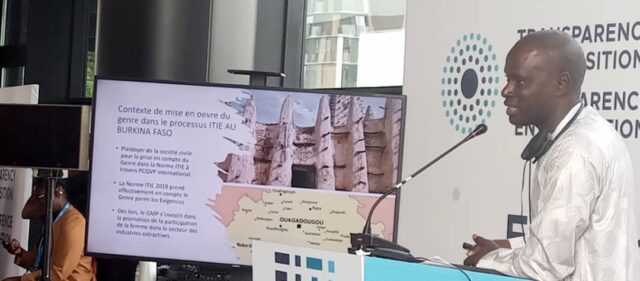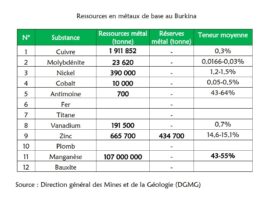From 13 to 15 June 2023, Dakar, Senegal, hosted the global conference of the Extractive Industries Transparency Initiative (EITI) on the theme of Transparency in Transition.
On 14 June, from 3.30 to 4.30 pm, Elie KABORE, Publication Director of minesactu.info and member of the EITI-Burkina Faso Steering Committee, took part in a French-speaking Africa panel on innovations in the EITI. The theme of his presentation was “Gender in the EITI process in Burkina Faso”. He was joined by Jean-Jacques Kayembe, National Coordinator of EITI-DRC, who presented the assessment of social and environmental obligations in the DRC. Fourera Sotty Maiga, President of the Association of Women in the Extractive Industries Sector of Niger (Association des Femmes du Secteur des Industries Extractives du Niger, AFSIEN) and also Regional Coordinator of Women In Mining Of West Africa (WIMOWA), emphasised the role played by women in a mining forum in advancing the African mining sector. Florent Michel Okoko, National Secretary of EITI-Congo, gave a presentation on the use of data and the economic modelling of companies, which was produced by EITI-Congo.
In his speech on gender in the EITI process in Burkina Faso, Elie Kaboré presented the evolution of the number of women in the extractive industries in Burkina Faso. Between 2018 and 2020, the number of women working in the extractive industries in Burkina Faso will gradually increase, rising from 6.08% in 2018 to 8.23% in 2020.
He recalled that following a plea from civil society, through Publish What You Pay (PWYP) International, the International EITI has taken gender into account in the 2019 EITI Standard in 4 requirements. Burkina Faso is therefore committed to promoting the participation of women in the extractive industries sector. This has been made possible at national level thanks to a legal and political framework favourable to women’s participation in development, with the existence of laws, sectoral policies and specific instruments. In implementing gender requirements, EITI report dissemination sessions have been organised exclusively for women. EITI reports have been simplified and systematically translated into national languages to make them easier to understand.
As a result, the civil society steering committee has succeeded in ensuring parity between its representatives on the EITI (4 women and 4 men). The EITI has set up a gender unit to advance the gender requirement, and data on jobs in EITI reports is systematically disaggregated according to the employee’s status (permanent or contractual), professional level (senior manager, middle manager, agent, worker) and nationality. Another area where progress has been made is the publication of information on gender in the EITI by the media.
The major difficulty in Burkina Faso in taking gender into account in the EITI is the instability of public administration representatives because their representatives come from people appointed to positions. This makes it difficult to assess progress in the representation of women from the public administration group on the GMP.
The challenges facing the EITI-Burkina steering committee are of 3 types, including documenting efforts to implement gender implementation at the level of each group (public administration, private sector and civil society), revitalising the gender unit and maintaining civic space for the free expression of civil society.
#Mines_Actu_Burkina






